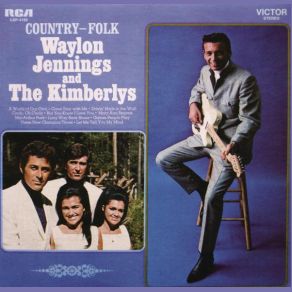Country-Folk
Download links and information about Country-Folk by Waylon Jennings. This album was released in 1969 and it belongs to Country, Outlaw Country genres. It contains 11 tracks with total duration of 33:27 minutes.

|
|
|---|---|
| Artist: | Waylon Jennings |
| Release date: | 1969 |
| Genre: | Country, Outlaw Country |
| Tracks: | 11 |
| Duration: | 33:27 |
| Buy it NOW at: | |
| Buy on iTunes $9.99 | |
| Buy on Amazon $9.99 | |
Tracks
[Edit]| No. | Title | Length |
|---|---|---|
| 1. | MacArthur Park (featuring The Kimberlys) | 5:09 |
| 2. | These New Changing Times (featuring The Kimberlys) | 2:55 |
| 3. | Come Stay With Me (featuring The Kimberlys) | 2:43 |
| 4. | Cindy, Oh Cindy (featuring The Kimberlys) | 2:41 |
| 5. | Games People Play (featuring The Kimberlys) | 3:14 |
| 6. | Mary Ann Regrets (featuring The Kimberlys) | 3:51 |
| 7. | Let Me Tell You My Mind (featuring The Kimberlys) | 2:55 |
| 8. | Drivin' Nails In the Wall (featuring The Kimberlys) | 2:35 |
| 9. | Long Way Back Home (featuring The Kimberlys) | 2:50 |
| 10. | But You Know I Love You (featuring The Kimberlys) | 2:31 |
| 11. | A World of Our Own (featuring The Kimberlys) | 2:03 |
Details
[Edit]Not to be confused with his 1964 debut ,Folk-Country, 1969's Country-Folk pairs Waylon Jennings with the folk harmony group the Kimberlys and, contrary to the title, everybody involved doesn't spend too much time singing either country or folk. The sounds and songwriters of 1969 dominate: Waylon and the Kimberlys tackle Jimmy Webb's "MacArthur Park" and Joe South's "Games People Play," while finding songs by Jackie DeShannon ("Come Stay with Me") and Gordon Lightfoot ("Long Way Back Home"). These sit next to Harlan Howard's "Mary Ann Regrets" and three songs by Harold Gay, including a song co-written by Waylon called "These New Changing Times" that sums up the vibe of the whole project. Country-Folk isn't tethered to tradition — it's a quintessentially modern album for 1969, dripping with strings; dressed in harmonies and horns; accentuated by harmonicas, harpsichords, and 12-string guitars. Sonically, it's a cousin to Glen Campbell's gorgeous hits of the late '60s, such as "Gentle on My Mind" and "Wichita Lineman" — it's no coincidence that the first song here is a Jimmy Webb cover — which also straddled the line between country and pop, leaning far closer to the former, thanks to an emphasis on melody and texture. The Kimberlys are quite comfortable in this setting and Waylon is less so, but not by much; his resonant baritone might be better suited for grittier music than this, but here he acts as a muscular, masculine counterpoint to the lush, soft surroundings, giving it a focal point that's welcome. Country-Folk still is a bit too tied to its new changing times — it not only evokes its era, it belongs to it — but as a pop artifact, it's worth hearing, and is one of the more entertaining oddities in Waylon's discography.